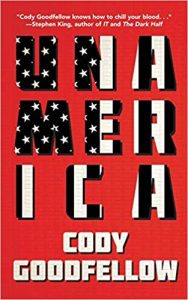Near Future Speculator: Paul Di Filippo Reviews Unamerica, Rule of Capture, The Warehouse, and Future Tense Fiction
 Unamerica, Cody Goodfellow (978-1732124059)
Unamerica, Cody Goodfellow (978-1732124059)
Rule of Capture, Christopher Brown (978-0062859099)
The Warehouse, Rob Hart (978-1-9848-2379-3)
Future Tense Fiction, edited by Kirsten Berg, Torie Bosch, Joey Eschrich, Ed Finn, Andrés Martinez and Juliet Ulman (978-1944700959)
The world is running a fever, and science fiction is the thermometer, if not also the febrifuge. That is, whenever the genre is not busy gallivanting across the galaxy, science fiction can, with dramatic and entertaining narratives, alert us in allegorical fashion to the true dimensions of the present, and inform us of our direction and destination, as well as possibly forestalling the bad trips. But crafting such tales is hard work, forcing writers so inclined to grapple with material that is constantly in flux, and to risk the obsolescence of their work before it’s even published. Nonetheless, brave women and men persist in this monitory mode, and we can examine some of their latest ventures below.
Cautionary SF need not always assume the grim, grey mien of Orwell’s 1984. It can be savage, colorful, jesting, absurd, suspenseful, coolly analytical. Writers such as J.G. Ballard, Philip K. Dick, Steve Aylett, Robert Anton Wilson, and William Burroughs have pointed the way. Now, standing shoulder to shoulder with these piercingly visionary authors, comes Cody Goodfellow with his unstoppable behemoth of a black-humored jape, Unamerica.
The title of his book refers to a very specific place: an enormous secret subterranean city, emplaced in a series of caverns, both natural and artificial, formerly intended for commercial waste dumps.
Unamerica is a self-contained underground city run by a coalition of corporations in partnership with the federal government under the auspices of the Department of Commerce. An ideal focus group environment, where products from Olestra and artificial hearts to electronic mind control and nerve gas are tested on a captive market.
The anarchic place is covertly and forcibly populated with the outlaws and illegal immigrants, the deplorables and unwanteds and impoverished swept up in the meshes of the state.
Into this environment is deposited an anomalous chap, going by the name of Nolan Cordwainer Hatch. An “innocent” US citizen, Hatch makes the mistake of getting caught by the Border Patrol near the Mexican frontier, his privileges ignored. As it turns out, Unamerica will serve Hatch’s purposes as well as the straight metro-suburban world he was heading for. He’s smuggling a new drug into the US, a mushroom-based “entheogen” dubbed Secret Teacher, one dose of which gives objective visions of God and has the ability to induce total empathy in the user. Hatch is intent on nothing less than revolutionizing the dog-eat-dog world of capitalism, bringing about an earthly paradise.
He soon hooks up with the Green Man, a local bigwig who can help Hatch make and distribute the drug, and acquires a self-centered, savvy, snarky sidekick named Jaime Blasco. As Hatch navigates the incredibly complex and deadly social strata of Unamerica, he finds his task complicated by both the authorities in charge and the lack of reforming spirit among the desperate natives. Additionally a messianic nutjob named Orrin Litchfield and his posse are making moves to take over the city.
Goodfellow’s unremitting and fecund depiction of both the authoritarian evils and the egotistical and mercenary sins of the blinkered commoners is balanced by a genuine exploration of how people desire and bring about positive change, in society and in their individual lives. Hatch embodies this dichotomy in his own person, being motivated by both sincere utopianism and self-serving desires. His backstory—and his fate—are rich and surprising.
The propulsive engine of the novel is Goodfellow’s muscular, juicy language. The dialogue pops, action scenes are jet-powered, and descriptions are neon.
America is where the impossible almost happens every day. From the beginning, its faith in its own miracle has burned everything they touched, everything but themselves. Their national anthem enshrines the secular miracle, of Fort McHenry surviving the British bombardment because the star-spangled banner survived. America is the world’s greatest religion, and all the world believes. Whether they adore the shining city on a hill or curse the Great Satan, they fed it with their prayers, and made of it a god that put a man on the moon and wrote its burning name on the world’s face.
But the fire is burning itself out. Over its ashes, they’ve built a furnace to rekindle it, a hothouse of forced mutation that makes the impossible almost inevitable, to try to monetize and weaponize that dying faith, to change itself as it has always changed the world.
Harking knowledgeably back to such classics as Heinlein’s “Coventry” and Pohl & Kornbluth’s The Space Merchants, Unamerica is as contemporary as tomorrow’s headlines, and ten times as enjoyable and informative.
Two years ago, Christopher Brown brought us Tropic of Kansas, a day-after-tomorrow dystopia (albeit set on an alternate timeline) which surveyed America from the underbelly. A rough and gritty odyssey of the oppressed, the novel showed us a world tumbling into repression. The new book examines the same venue, but from a viewpoint of somewhat greater “privilege,” and it possesses a totally different tone and set of effects. While it is just as politically engaged, it functions more as a postmodern noir. Think of Pynchon’s Inherent Vice, and you won’t go far astray. Actually, to delve back even further, the novel reads like Robert Altman’s film of the The Long Goodbye, with an overlay of twenty-first-century wokeness. I consistently visualized hero Donny Kimoe as young Elliott Gould, with satisfactory mental-movie results.
Donny is a Houston lawyer who’s abandoned a lucrative practice to become a public defender. Perpetually broke, rumpled, hassled, belittled by his richer, more conservative peers, and still longing for his ex-girlfriend Joyce, Donny, when we first meet him, is desperately trying to stop one of his clients from being executed. But in the current climate—the US lost a war with China, surrendering Hawaii and other lands, and is now seeing terrorists under every bed—the justice system is stacked against Donny and his clients. When he is presented with a new case—that of Xelina Rocafuerte, deemed “…a rebel…subversive…conspirator against your own government.”—Donny wearily digs in. What he soon discovers is that Xelina was in reality a journalist who witnessed the literal lynching of a progressive activist, and, in the eyes of the state, must now be silenced.
Donny’s dogged campaign—inside and outside the courtrooms—brings him up against vigilantes, politicians, and his fellow lawyers, all of whom have things to hide, grudges to hold and nest to feather. He is chased, beaten, tortured, humiliated and threatened—and that’s just by Xelina’s distrustful comrades who should be on his side! But his stubborn optimism and world-weary sense of justice render the tale inspirational, often funny, and truly touching. Brown takes pain to depict Donny as being far from saintly, and the villains as being far from purely black-hearted. The sense that all the players in this sordid game are, to some degree, pawns of larger forces lends the tale moral and ethical dimensions not found in lesser works. Donny’s ultimate victory (?) is fully in line with this nuanced, shades-of-grey ethos.
As a working lawyer himself, Brown knows courtrooms from top to bottom, and the portions of the narrative occurring before judges—maybe a third of the text—is full of a breezy verismilitude that nonetheless evokes the pathos of a system populated by non-monsters trying to do what they think is right. (Even Perry Mason is rung in.)
Full of ingenious speculative touches (modern passports quiz the bearer every time they are deployed), melding the blunt partisan fervor of Norman Spinrad with the bitter street wisdom of James Ellroy, Rule of Capture illuminates hard times with the burning radiance of one good man.
The literature of man versus machine—of man turning into machine—and of the Moloch-like appetite which modern civilization has for its interchangeable, gear-like victims, all in the name of efficiency, service, profit and smoothness of operations, extends back into the nineteenth century, but really took off in the twentieth, with landmarks such as Lang’s Metropolis, Forster’s The Machine Stops, Chaplin’s Modern Times, and the Wachowskis’ Matrix series. With the advent of the internet, social media, and other digital technologies, subtler and more insidious permutations of the theme have come under the pens of Cassandran authors. Dave Eggers’ The Circle is a prime example.
Rob Hart delivers a nigh-perfect and stunning instance of this motif in The Warehouse. The book’s meticulous attention to vivid sensory details; its plausibility; its strictly modeled yet startling extrapolations; its winning characters and unpredictable plot (brace yourself for a flood of big reveals at the climax), all collude to deliver a suspenseful, emotional drama that perfectly limns the dilemmas we as consumers and corporation-empowerers face today. What is the value of honest labor? What is the correct ratio of convenience to morality? How big is too big? What does each citizen owe to his or her fellow citizens, to the state, and to the planet?
We start the book by reading the blog of Gibson Wells, multibillionaire founder and ruler of Cloud. Modeled slyly and cleverly on Amazon, Cloud is the dominant business on the future Earth, supplying consumers with every kind of product and service, all drone-delivered. But they have gone one step further, melding workers and residents. With over thirty million people in its employ and living on its mammoth campus-cum-warehouse sites, they function like the old company towns times one hundred. Smartwatches on every wrist track inhabitants and provide access to all services and facilities. A kind of Huxleyan color-coded system of clades keeps workers in order.
Our realtime narrative after the blog entry—and we will return at intervals to Gibson Wells’s illuminating musings—opens with a brutal Steinbeckian vibe. Crossing a climate-blasted landscape, a busload of despairing, weary, desperate refugees is deposited in front of a Cloud intake center. They rush inside in hopes of employment. Some make it, some are rejected. A dual perspective from the vantages of two new employees will inform the rest of the action.
We see things through the eyes of Paxton, an ex-prison guard who ends up on the Cloud security team, and through the sensibility of Zinnia, a young woman who becomes a picker in the warehouse. Oh, yes, Zinnia is also secretly a ruthless, lethally trained industrial spy out to steal all of Cloud’s secrets. When she and Paxton intertwine their fates, the tale becomes a contest between naivete and cunning, love and disdain, commerce and spirit, and also a race to destruction or hopeful transcendence.
Hart inhabits each of these characters with multiplex richness. Paxton is a defeated fellow who just wants to get along, but who has sparks of rebellion and dissatisfaction. Zinnia, beneath her hardbitten shell, harbors human frailities that might prove her undoing. As well, the subsidiary characters pop off the page: Dakota, Paxton’s partner; Rick, the nasty manager; and Wells himself, among many others.
This last-named perspective offers us the most challenging material. Is Wells a monster or savior? What are the alternative to his philosophy for a stressed-out world? Hart forces the reader to examine his or her own values in order to decide whether this book is a dystopia, or just a realistic portrait of an unfortunate hardscrabble era in humanity’s rollercoaster existence.
One anti-Cloud figure forcefully states the case for the opposition:
Let me tell you something about Cloud. They are the choice we made. We gave them control. When they decided to buy up the grocery stores, we let them. When they decided to take over farming operations, we let them. When they decided to take over media outlets, and the internet providers, and the cell phone companies, we let them. We were told it would mean better prices, because Cloud only cared about the customer. That the customer was family. But we’re not family. We are the food that big businesses eat to grow bigger.
Hart refuses to endorse any position fully, while concentrating on the glories and tragedies of the humanistically defined individual in a world that sees us as only organic units of production and consumption. It’s a powerful weapon to cut through all Gordian knots.
Novelists seeking to remain topical and ahead of events face a long period of composition and a long time in the publishing pipeline, forcing them to dance a lot faster than accelerating reality. Short-story writers can accomplish their projections quickly and often get them into print quicker, especially with online platforms, allowing them to surf more nearly on the bleeding edge of life. This is evident in the anthology under consideration today, Future Tense Fiction, which reprints stories that appeared at the Slate website starting in 2016. Fourteen tales, from newer writers and older hands, encompass a wide territory of flashpoints. Here are some standouts.
Nnedi Okorafor’s “Mother of Invention” examines smart-house technology—a domestic intelligence at least somewhat sentient—which assumes a protective mothering stance towards its occupant, a human mother-to-be in extremis. Set in a future Nigeria that’s marvelously strange, the tale represents the growing movement of Afrofuturism to perfection.
“When Robot and Crow Saved East St. Louis,” by Annalee Newitz, has nothing to do with MST3K, but instead concerns a health-monitoring drone and some very smart urban birds who forestall an epidemic. The narrative is sleek and fun, a kind of optimistic cyberpunk, if that’s not a paradox.
Emily St. John Mandel delivers “Mr. Thursday,” a tale of the unswervability of fate which is full of enjoyable, eternally relevant melancholy while not being particularly hot-button-centric.
My favorite story is Mark Stasenko’s “Overvalued,” which embeds human career potential into a commodified marketplace, resulting in greedy investors backing bright sixteen-year-olds for a share of their future earnings. Stasenko hits the ground running with his concept and delivers a series of short sharp shocks.
Three stories have a go at what it means to be posthuman. Meg Elison’s “Safe Surrender” chronicles the ancestral questings of a “hemi,” a being half-human and half alien Pinner. In “Lions and Gazelles,” Hannu Rajaniemi enacts a reality-tv-style athletic endurance event featuring body-hacked contestants. And in “The Starfish Girl,” Maureen McHugh looks at an adolescent Olympian whose genome has been supplemented with non-human material. All three find both positive and negative aspects to their technologies.
Conjuring up Cory Doctorow, Lee Konstantinou’s “Burned-Over Territory” focuses on a new model of civic interaction—the extensive Federation of commune-style Houses—to chart how the notion of a nation could change. Paolo Bacigalupi delves into Richard Calder territory with “Mika Model,” the tale of a muderous love android. And finally, Charlie Jane Anders humorously considers the fate of New Lincoln, a “perfect city” undergoing a kind of Leningradian starvation siege.
While all these fine tales deal fruitfully and entertainingly with their au courant material, they break no real new ground in either treatment or insights. Okorafor’s story, for instance, blends tropes of Bradbury with those of Sheckley, while Mandel’s could be an incident from Leiber’s Change War series. I actually find this continuity with older SF a virtue and a delight, proving that the toolkit and ethos of classical speculative writers remain just as useful and vibrant today as when the giants of other eras, facing their own nerve-wracking headlines, first minted the techniques and attitudes that continue to guide us headlong into the often-scary, sometimes delightful lands where we will spend the rest of our lives.
 While you are here, please take a moment to support Locus with a one-time or recurring donation. We rely on reader donations to keep the magazine and site going, and would like to keep the site paywall free, but WE NEED YOUR FINANCIAL SUPPORT to continue quality coverage of the science fiction and fantasy field.
While you are here, please take a moment to support Locus with a one-time or recurring donation. We rely on reader donations to keep the magazine and site going, and would like to keep the site paywall free, but WE NEED YOUR FINANCIAL SUPPORT to continue quality coverage of the science fiction and fantasy field.







